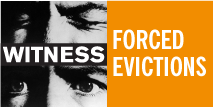The Forced Evictions campaign ran from 2011-2014. The primary goal of the campaign was to advocate for an end to forced evictions by working with underrepresented and at-risk communities to protect their rights to housing, land, and livelihood. The campaign used video to make communities’ stories heard in the push for accountability for forced evictions resulting from development. Local campaigns illustrated trends in rural and urban communities, as well as those underlying forced evictions caused by infrastructure projects and mega-events like the World Cup and the Olympics. In partnership with the Habitat International Coalition, a global network of more than 400 organizations around the world, WITNESS supported local and national campaigns primarily in five countries—Brazil, Cambodia, Egypt, India, and Mexico.
Since 2011, WITNESS trained 144 human rights activists and supported 24 video advocacy campaigns; over 120 advocacy videos have been created, shared and distributed by WITNESS and partners since the beginning of the campaign. There were significant advocacy successes at the local level, and WITNESS also collaborated with key allies to leverage these local case studies at the regional and international levels to impact key policies and decisions around forced evictions globally. Read more on the blog.
Based on the learnings and insights from our local and international campaign partners, WITNESS and Amnesty International released a Forced Evictions Advocacy Toolkit in late 2013. This multimedia set of resources aims to support activists, social movements and communities fighting eviction. From outlining the obligations of governments to sharing videos that help foster debate and inspire mobilization, the Toolkit provides critical resources to support the efforts of those advocating against forced evictions locally and globally, as well as those working to raise awareness on the issue. The Toolkit is available in 8 languages and is available for free download here.
